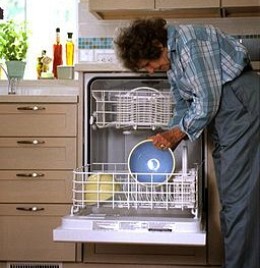27 Dishwasher Maintenance Tips To Make The Most Of Your Machine
 A dishwasher is a marvelous time- and labor-saving device. A green one will also conserve energy and water, actually consuming less water than washing plates and pots by hand. (Besides, most folks find hand washing dishes just plain icky!) Keep this important kitchen appliance in great shape and it will reward you with optimal performance over its lifetime. Here are 27 simple dishwasher maintenance tips.
A dishwasher is a marvelous time- and labor-saving device. A green one will also conserve energy and water, actually consuming less water than washing plates and pots by hand. (Besides, most folks find hand washing dishes just plain icky!) Keep this important kitchen appliance in great shape and it will reward you with optimal performance over its lifetime. Here are 27 simple dishwasher maintenance tips.
Purchase/Installation
1. Look for Energy Star certification when shopping for a new dishwasher. This will ensure an energy-efficient, money-saving appliance.
2. Expect to pay anywhere from about $250 for the cheapest model to approximately $1000 for top quality. Cost of dishwasher installation by a licensed plumber depends on your location, appliance type, and complexity of the job.
3. Start by switching off electric power at the breaker box when replacing a dishwasher yourself. Shut off the hot water (or cold water if your new model has its own water heater).
4. Make sure the dishwasher is electrically grounded, for safety's sake.
5. Avoid leaks by checking that the machine is in a level position.
6. Do not hold onto your dishwasher by its door when moving or tilting it.
7. Read the manufacturer's operating instructions to find the best way of loading, care directives, and other useful information.
Cleaning
8. Wipe the dishwasher gasket every few days.
9. Clean the trap -- pulling it out if possible -- and clear the nozzles on the spinner arms as needed.
10. Remove and clean the filters on a regular basis by rinsing with warm water (and using a soft brush if necessary), unless you have a machine with a self-cleaning filter.
11. Use an anti-limescale product once a month in an area with hard water.
Before Each Use
12. Check that any plastic dishes you want to clean are dishwasher safe.
13. Scrape off large food particles. There's no need to pre-rinse; that just wastes water.
14. Run the garbage disposal to clear out your plumbing pipes, allowing proper drainage.
15. Run the hot water in your sink so it will be at full temperature when you start the dishwasher. (Keep the initial run for watering houseplants). This step is unnecessary, though, for a dishwasher with a built-in water heater.
16. Make sure that your dishwasher powder is dry. Use a measured amount -- don't just eyeball it, because you may overestimate.
No-nos
17. Don't substitute liquid detergents meant for hand washing dishes. They'll produce an overload of suds, which may end up leaking bubbles all over your kitchen floor.
18. Don't use more dishwasher detergent than the manufacturer directs.
20. Don't leave the machine connected to your electricity and water line while you're away for an extended period.
21. Don't expose the water lines to freezing conditions.
22. Don't overuse vinegar -- or combine it, in any quantity, with bleach. The former can eat away at your door seal and the latter may produce dangerous fumes.
23. Don't stick with the same detergent powder if you're not getting good results. Experiment with a different brand.
24. Don't set the wrong temperature. You need high heat to completely clean heavily soiled dishes, but energy-saving low temperatures (130 F degrees) are best for less soiled loads, as well as glassware. However, 150 F or more is recommended for pots and pans.
25. Don't use heat to dry your dishes. Conserve energy by letting them air-dry instead.
26. Don't select the "Rinse-Hold" for a small amount of dishes. Save 2-3 gallons of water by placing them in a rinse basin.
27. Don't use the dishwasher for your finest china and utensils. It's likely to erode gold trim, crack crystal, damage high quality knives, and discolor copper.
Laura Firszt writes for networx.com.
Looking for a Pro? Call us (866) 441-6648

Plumbing Average Costs
Plumbers Experiences

Pool Wiring Repair Eliminates A Potential Hazard

Whole House Fan Installation Saves Me Money On Electricity



